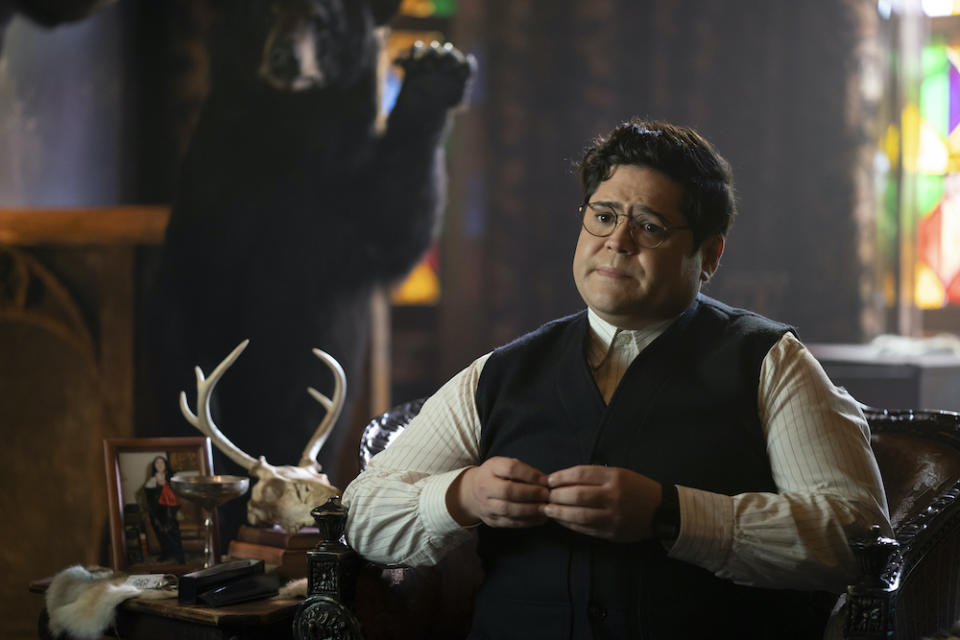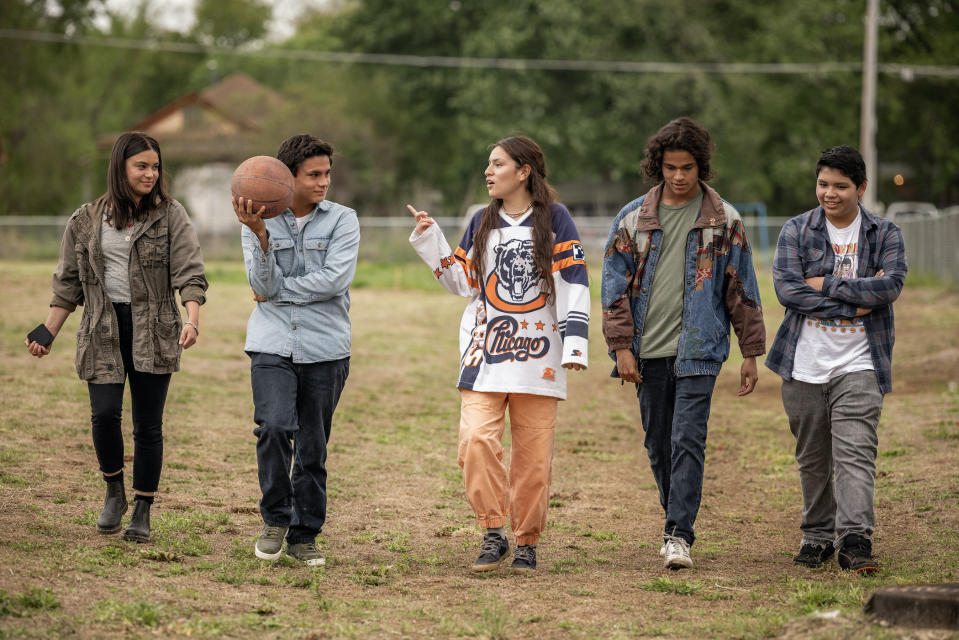From Gay Pirates to Neurotic Vampires, Taika Waititi’s Radical TV Universe Blends Silliness with Soul

- Oops!Something went wrong.Please try again later.
There are many ways to joke about vampires and pirates, but few that would make you care about them in the process.
That’s the essence of Taika Waititi’s brand. From the self-aware machismo he brought to “Thor” to the imaginary Hitler he played to cheer up an alienated Nazi child in “Jojo Rabbit,” Waititi has excelled at finding pathos in ludicrous places. In recent years, as his star power has blossomed, that distinctive sensibility has gone from the touchstone of his writer-director-star talent to become a full-on aesthetic that bleeds into the work of others in his orbit and the worlds they build on TV: Welcome to the Taika-verse.
More from IndieWire
Even in his early days as a filmmaker, with the infectious cringe-comedy of “Eagle vs Shark” and the bittersweet father-son saga “Boy,” Waititi’s trademark blend of silliness with soul was unmistakeable. As his name has expanded into a brand, the shows that emerged with his participation reflect that same impulse, even as they take many different forms. The trio of shows associated with Waititi — “What We Do in the Shadows,” “Reservation Dogs,” and “Our Flag Means Death” — provide a radical new take on the outsider in popular culture. And though Waititi can’t take sole credit for their successes, each show echoes his influence in exciting ways that shake up familiar formulas with feeling.
It was clear early on that “What We Do in the Shadows,” adapted from the mockumentary that Waititi co-directed with his pal Jemaine Clement, would take its central conceit and run as far as it could go. It was less obvious that the show would do such a fine job of deepening the neurotic plight of the various undead living together in a hectic Staten Island home, as well as the yearning to belong that haunts sensitive familiar Guillermo (Harvey Guillén).
By the end of Season 3, so much has changed about the dynamic between its cast that it almost seems heading toward a show finale: The snarky Lothario Laszlo (Matt Berry) is ready to follow his kooky love Nadja (Natasya Demetriou) to Europe, while insecure Nandor (Kayvan Novak) awaits an “Eat Pray Love” world tour with Guillermo. Energy vampire Colin Robinson (Mark Prosksch) has dropped out of the picture under rather gruesome circumstances. It’s a natural endpoint for several arcs at once, but current showrunner Paul Simms and writer Sam Johnson guide the story in its final minutes to a series of shocking twists, a few of which are even heartbreaking.
Yes, heartbreaking. “What We Do in the Shadows” is loaded with zany pitch-black comedy and supernatural slapstick that often suggests a gothic spin on “The Office,” but in the process, it has grounded its outsized characters in genuine stakes (pun intended). From the moment in the pilot where Guillermo admits to the camera that he’s aspired to be a bloodsucker ever since he saw Antonio Banderas bring a Latino flavor to “Interview With The Vampire,” the show has scrutinized the desire to find happiness in a messy, indifferent world. Nandor may be an undead conquerer who has lurked the world for millennia, but he’s also a romantic loner. Living forever is not the same thing as finding peace. That’s the essence of a Taikaverse: preposterous and undeniably profound at once.

Russ Martin / FX
And so are the pirates at the core of “Our Flag Means Death,” one of the most exciting and underappreciated new TV undertakings to come along this year. Waititi himself doesn’t surface on the show, which he produced along with creator David Jenkins, until the fourth episode. Buried under a wizardly beard and a wild-eyed conquerer’s stare as Blackbeard, Waititi briefly threatens to steal the show. Instead, he adds to it, as the newfound companion to Rhys Darby’s wannabe pirate Stede Bonnett, who flees 18th century domesticity to a poorly-planned life at sea.
Both men envy the other’s ambitions, and a tentative agreement to help each other about blossoms into a much deeper bond. It’s not the only one, as the show builds out a series of other nutty crewmembers who frolic and flirt in unexpected ways. “Our Flag Means Death” is a galvanizing queer pirate love story unlike any that has been seen before, and its outré comic tone eventually balances out with touching revelations about a masculine world riddled with repressed feelings. They don’t stay that way for long. The show, which somehow has yet to get a second season, takes a sensational step forward in its closing moments that the characters never could have anticipated it, as if they themselves thought they were on a show designed to play it safe.
No such luck. The Taikaverse interrogates the norms of conventional storytelling milieus even as it maintains a goofy grin throughout. Which brings us to “Reservation Dogs.” Waititi co-created the show, about an anarchic group of indigenous teens in Oklahoma, with longtime peer Sterlin Harjo. Like Waititi, Harjo is a product of the Sundance ecosystem, and the pair forged a bond in the mutual desire to brighten up the representational tropes they were seeing on screen. Inspired in part by the rambunctious misanthropes of Hal Ashby’s shaggy-dog stories, the kids at the center of “Reservation Dogs” know what they don’t want more than what they do.

Shane Brown / FX
Wreaking havoc in a small town informed but not defined by neglect, they grapple with the loss of a friend and the restrictive nature of their community by envisioning an escape plan that never seems altogether realistic. Watching them plot and dream, however, it’s impossible not to get drawn into essence of their desire. “Reservation Dogs” swaps the caustic wit of “Our Flag Means Death” and “What We Do in the Shadows” for a more melancholic wit steeped in loss — the loss of stability, the loss of innocence, the loss of country. “Reservation Dogs” is a tragic meditation on the way the systemic oppression of indigenous people continues to reverberate across generations, but it doesn’t wallow in that sad truth so much as use it as a launchpad for a more sophisticated (and sometimes quite funny) coming of age story.
And that’s a touchstone of the Taika-verse, too. The world may be a slippery arena of mixed emotions and dead ends, but it can be gratifying — even fun — to sort through those challenges. Waititi and his collaborators don’t sanitize their settings, but they recognize that sometimes all it takes to peer through the darkness is a valiant sense of humor to light the way. That’s a cheesy sentiment on the surface but in the right context, it’s also a fundamental truth, and one that Waititi has brought to life with a perfect funny-sad balance that even cynics can’t deny.
Best of IndieWire
Emmy Predictions: Outstanding Supporting Actress in a Limited or Anthology Series or Movie
Emmy Predictions: Outstanding Supporting Actor in a Limited or Anthology Series or Movie
Sign up for Indiewire's Newsletter. For the latest news, follow us on Facebook, Twitter, and Instagram.


